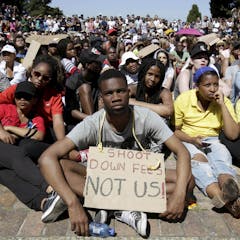
University of Johannesburg

The University of Johannesburg, one of the largest, multi-campus, residential universities in South Africa, seeks to achieve the highest distinction in scholarship and research. Born from the merger between the former Rand Afrikaans University (RAU), the Technikon Witwatersrand (TWR) and the Soweto and the East Rand campuses of Vista University in 2005, the University of Johannesburg fosters ideas that are rooted in African epistemology, but also addresses the needs of South African society and the African continent as it is committed to contribute to sustainable growth and development.
Links
Displaying 541 - 560 of 626 articles

South Africa’s higher education minister has dealt with fee increments for 2017 but sidestepped students’ fundamental issue: an ongoing call to make higher education free for all.

South Africa’s Parliamentary Budget Office had 10 months to prepare its findings about the cost of a nuclear programme. Its final report was little more than a summary of other institutions’ work.

South Africa’s ruling party has lost its moral and intellectual capacity to claim the mantle of leadership. The country’s economy won’t recover unless new political alignments emerge.

Maintaining a large refugee population when the country is struggling to deal with its own challenges is a big ask

A change of attitude which comes with some deep introspection by South African business leaders can help address some of the country’s key socioeconomic challenges.

The lack of service integration and the paucity of welfare services make poor people’s task of caring for their familes much harder. A small monthly cash transfer can’t solve all their challenges.

TV talk and makeover shows have a preference for spectacle and conflict. But new collaborative models may be the future.

There’s a widening global crisis in the legitimacy and credibility of leadership. It can be attributed to five sources: unable; unintelligent; immature; immoral and/or destructive leadership.

The decolonisation debate in South Africa’s universities raises critical issues about the relationship between power, knowledge and learning.

Talking about food is a productive way to understand a complex world. The dinner table is a place where the shame of poverty is most acutely experienced.

The new forms of protest in Zimbabwe raise the possibility that the country’s long-simmering crisis may have reached boiling point. The time could indeed be ripe for a unique form of politics.

Ridley Scott’s ‘Blade Runner’ has transcended its sci-fi/hardboiled noir detective thriller formula to spawn a dedicated cult following.

South African students’ demands for free university education are not going away. Nor are the country’s economic realities.

Narendra Modi’s first trip to Africa has widely been heralded as a success, but his brand of diplomacy has left the most pressing issues for the continent unaddressed.

Former South African President Thabo Mbeki remains a puzzle to many of his compatriots. A new book, ‘The Thabo Mbeki I know’, will help to understand him better.

The unavoidable regime of publication pervades contemporary academic life across the world. While presented as a virtuous thing, it can actually suffocate the academic profession.

Society needs intelligent and mature leaders. Acquiring such skills is a lifelong process.

The huge problem of youth unemployment in South Africa appears to be getting worse. New research will hopefully amplify their voices and inform more realistic interventions to combat the monster.

The price of voice communication has come down in South Africa. But poor regulation and a lack of competition means that the country still has some way to go to reduce the cost of communication.

Daytime television talk shows are known for their confrontational style. But there is a different model: a harmonious, cohesive and relational approach may offer a better way to communicate.
